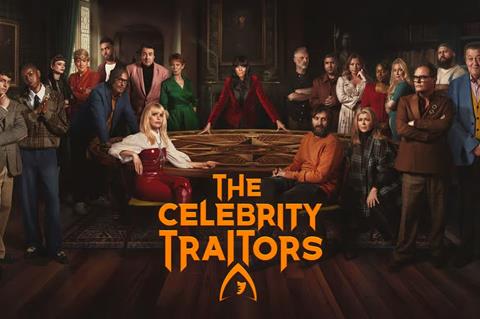Beneath the cloaks and candlelight of The Celebrity Traitors lies a powerful lesson about the human heart. Alice Pinney believes that for Christian parents, this BBC hit offers a creative doorway into talking with children about truth and redemption

The TV show that everyone has been talking about recently is BBC’s Traitors, which has returned for a fourth series, this time with a celebrity twist. The star-studded line-up includes funnyman Alan Carr, prominent atheist and thinker Stephen Fry, and singer-songwriter Cat Burns. Set in a castle in the Scottish Highlands, the show follows a small group of “traitors” as they secretly plot to eliminate the rest of the contestants, “the faithful,” through lying, backstabbing and deception.
The premise of the show is part reality TV, part psychological thriller – giving the feeling of a televised version of the youth group classic Mafia. But beneath the drama and humour, The Traitors plays with profound ideas: truth and deception, guilt and innocence, life and death. These are not small themes; they are the kind of topics our faith asks us to wrestle with, even if we usually prefer to avoid them. So, what might The Traitors reveal about our society, and how could Christian parents use it as a springboard for honest, faith-shaping conversations at home?
The thrill of deception
At the heart of The Traitors is a game of deceit. The traitors, a minority chosen in secret, must keep the trust of the faithful whilst quietly eliminating them one by one. In the meantime, the faithful try to unmask the traitors before it’s too late. The result? Evenings of entertainment filled with bluffing, suspicion and psychological warfare.
Deception may make great TV, but it leaves us feeling uncomfortable
And yet, for many viewers, it’s the traitors who are the most fascinating, deception seems so much more exciting than honesty. The faithful plod through tasks and arguments, whilst the traitors live on the edge, balancing guilt and exhilaration. The show exposes what Jeremiah wrote long ago: “The heart is deceitful above all things’ (Jeremiah 17:9). There’s something within us that is drawn to the idea of getting away with something, even when we know it’s wrong.
Alan Carr captures this tension beautifully (and entertainingly). After his first ‘murder’ he confessed to feeling unexpectedly guilty, despite knowing it was only a game. His comment reveals something deeply human: that even when wrongdoing is fictional, it still stirs our conscience. As Christians, we would say that it’s because the moral law is written on our hearts. Deception may make great TV, but it leaves us feeling uncomfortable.
Digging graves and facing death
If deception drives The Traitors, then death haunts it. The show’s language is drenched in mortality: players are ‘murdered,’ tasks and set in graveyards, and in the very first episode, contestants dig through their own ‘graves’ to find shields that might save them from elimination that night.
The series is currently airing right in the middle of Halloween season. As families wander past plastic skeletons and fake cobwebs, The Traitors has us watching celebrities role play murder by candlelight. It’s not hard to see why some parents might worry that the show risks feeding an enchantment with the macabre.
Where the world flirts with death as a spectacle, the Gospel confronts it and proclaims resurrection
And yet, perhaps the show also exposes something work talking about. Our society often avoids conversations around death: tiptoeing around it, sanitising it or turning it into dark humour. The Traitors treats death as a game, yet even within it, the sadness the contestants express when there has been ‘murder’ taking place seems surprisingly real. Even fictional death seems to stir emotions we often keep buried: loss, fear, vulnerability.
For Christians, these are not emotions to suppress but to face with hope. The Bible doesn’t shy away from death, “It is better to go to a house of mourning than to go to a house of feasting,” says Ecclesiastes 7:2 because facing death teaches us how to live. Paul writes that in Christ “death has been swallowed up in victory” (1 Cor 15:54). Where the world flirts with death as a spectacle, the Gospel confronts it and proclaims resurrection.
So yes, The Traitors can feel dark, but it also offers an unexpected doorway into one of the hardest conversations families can have: what happens when we die and why Christians don’t need to be afraid.
The Traitors thrives on exactly that human instinct to point fingers rather than face ourselves
The problem of judging others
Possibly my favourite line so far came from Alan Carr, “You can’t call someone a traitor just because they have a better vocabulary than you.” It’s funny, but it also nails another uncomfortable truth. The game is built on suspicion and accusation. Contestants debate who looks most guilty, who’s lying or trustworthy, all whilst ignoring or masking their own motives and fears.
Jesus once asked, “Why do you look at the speck in your brother’s eye and pay no attention to the plank in your own?” (Matthew 7:3). The Traitors thrives on exactly that human instinct to point fingers rather than face ourselves. It’s fascinating but also a mirror: the problem of judgement didn’t start on the BBC.
Turning entertainment into conversation
So how do we respond to this show? As with so much in popular culture, the temptation is to either ignore it or to worry about its influence. But perhaps The Traitors can be an opportunity.
Watching together changes the dynamic. Instead of passively consuming, can the drama be used to spark conversation. Questions like:
- Why do you think people enjoy pretending to deceive others?
- How do you feel when someone lies to you?
- Why do you think death features so much in our TV and games?
- What does it mean to be ‘faithful’ and why is that hard sometimes?
You may find your children’s answers surprisingly honest.
Read more:
How Taskmaster can inspire your family to celebrate God-given creativity
Sketch is a film that will help Christian families stop and consider their emotions and take them to Jesus
How Christian families can help shine a light this Halloween
Of course, discernment matters. For some, the language of ‘murder’ or the eerie imagery might be unsettling, particularly in this Halloween season. It’s wise to consider what’s age appropriate. But with sensitivity, The Traitors can actually help families do what our culture avoids: talk about hard things with honesty and hope.
And, amid the tension and darkness, don’t forget joy. There are moments that have had viewers in stiches: ridiculous tasks, dramatic accusations and Alan Carr’s deadpan commentary. Sometimes theology hides behind humour, and a shared laugh can often pave the way for a deeper conversation later.
Faithfulness in a faithless world
In the end, The Traitors works because it plays with ideas that are profoundly human. It holds up a mirror to our culture, showing both our fascination with darkness and our longing for something more.
For Christians, that ‘something more’ is not a game to be won but a relationship with the one who is truth itself. In a world of half-truths and hidden motives, Jesus stands as the faithful one who was betrayed so that we might be forgiven.
So yes, enjoy the drama. Laugh at the absurdity of celebrities in cloaks accusing each other of treachery. But don’t miss the opportunity The Traitors gives us, to talk about what it reveals, to challenge our own hearts, and to remind our children that truth and life will always outlast deceit and death.


































